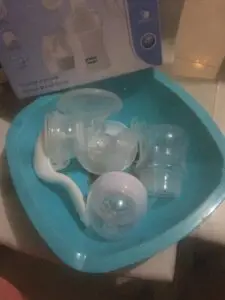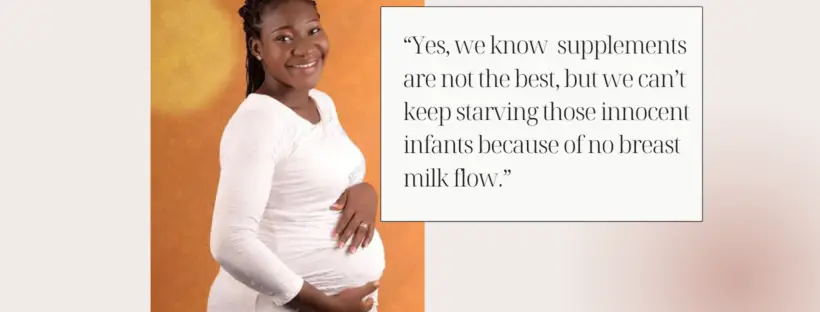Josephine contacted us after reading Dr. Christie del Castilo-Hegyi’s letter to health care professionals about the dangers of insufficient breastfeeding and the Baby-Friendly Hospital Initiative. Josephine is from Lagos, Nigeria, and wants to tell her story, because she believes every mother should know how to supplement her baby safely until her milk is flowing, no matter what country she lives in, to prevent brain damage and death from insufficient breastfeeding.
She writes: After I gave birth to my son, my baby was very hungry and cried inconsolably. I was concerned there was no milk coming out of my breasts. I told my husband to go buy baby milk to give to our son until my breast milk flowed. But my doctor was opposed to this idea, saying that exclusive breastfeeding is the best. I listened to my doctor but was confused because there were four mothers in the general ward (hospital) with me whose breasts didn’t flow immediately either. Two of the mothers amongst us didn’t follow the instructions of the doctor. They bought baby milk to supplement their babies, while I and the one other mother were waiting for our breast milk to flow.
I noticed in the hospital ward that my baby, and that of the other mother whose milk wasn’t flowing, cried inconsolably, while those other babies on supplements were sleeping. The only time those babies cried was when they were hungry.
I told the doctor during the ward round what I observed, and he said my baby would be fine. The new nurses knew I had no milk, so they told me (secretly) that I should get baby milk supplements and feed him, and then when my breast milk started flowing, I should discontinue the supplements. But I listened to my doctor.

Complications related to underfeeding exclusively breastfed newborns are the leading causes of newborn hospitalizations globally. These complications include jaundice, hypoglycemia, and dehydration, all conditions prevented with adequate and timely supplementation when breast milk is not enough. Every mother can protect her child from these complications by knowing the signs of a HUNGRY child. Josephine’s baby was most likely experiencing hypoglycemia from the way she described his crying.
We were discharged, and I got home only to discover that when he was latching, he would cry inconsolably nonstop. On the fourth day, my milk came in, and I breastfed him to exhaustion. I monitored him for a week with no improvement. I took him back to the same hospital, and the matron checked him and his eyes and said he would be fine. I should not worry or introduce the baby milk to him. I was worried. He had lost a lot of weight.
I continued breastfeeding, and I noticed that he became very weak, and his crying was faint. I called my husband from the other room, and we rushed him to the hospital. The same doctor that had told me to keep breastfeeding was on duty. He was trying to look for a vein on his body for an IV, but he couldn’t find one. I was screaming to give him oxygen, and the doctor had the nurses remove me from the room. The doctor then examined him and told us his brain was dead because he had not been feeding well. That’s how we lost him.
I was so bittered after the 40 weeks of pregnancy, the pains, sleepless nights, craving my baby, and crying, that I nearly lost my sense of reasoning. I was admitted to a hospital for 2 weeks on an IV drip. When they injected me, I felt dizzy and slept. I didn’t know what was happening around me. I wasn’t myself. I was still sad about losing my baby.
Had it been that I had money or connections with Human Rights organizations, I would have sued [the doctor] and made them collect his license, but in our country, money speaks.
God blessed me with a new baby, and I delivered him at another hospital, never going back to the other hospital. My husband and I bought some baby formula because we didn’t want to take any risk of losing another baby. When I gave birth, my baby couldn’t suck. The doctors, nurses, and matron on duty that day tried forcing him, but there was no result, so due to what happened to my last baby I was scared. The night doctor came for hospital ward rounding, and I explained to him that my previous baby died from not feeding well.
I asked the nurse to put my baby to my breast so that he can suck the colostrum (I learnt it’s rich in proteins, minerals, fats, and antibodies). The next day when I noticed he wasn’t satisfied after sucking, I fed him baby milk [formula].

My baby is sleeping after spoon-feeding him baby milk.
To supplement him I bought bottled table water and boiled it. I poured some cooled-down hot water inside the cup, added the baby milk, covered it, and allowed it to cool down a bit before I fed my baby with a spoon. It was a long process. Mothers are given this spoon and cup in the delivery bag by the hospital.

Mothers are given this spoon and cup in the delivery bag by the hospital. The cup and spoon are sterilized before feeding.
My baby could not latch, so my doctor told me to hand express my milk and feed my baby with a bottle. I’m very careful because the doctor warned me sternly about bacteria when using this method. I must wash my hands before expressing into a sterilized bowl. I must sterilize my baby’s bottle every feeding.

My hand expressed milk to feed my baby

My baby is on exclusively expressed breast milk with bottles, and I’m happy he is growing fine.
Josephine was worried about hand expressing enough milk to continue feeding her baby, and her hands, arms, and back had begun to hurt. We sent her financial resources to buy a manual pump (an electric pump was not available, and the manual pump was more portable for her). Her milk supply has doubled, and her pain has resolved.

Josephine’s story is a prime example of why every mother deserves individualized infant feeding care based on her personal needs and demographic resources. The Baby-Friendly breastfeeding policies are based on the fact that many people in impoverished developing countries do not have access to safe water and affordable formula. This policy must be updated to reflect the full spectrum of conditions in the world that affect infant feeding safety. For example in Lagos, 70 percent have clean drinking water, and 30 percent do not.
Safe infant feeding is a human rights issue. Babies have no voice and should not be forced to starve or become brain injured due to the “baby-friendly” breastfeeding protocol that is promoted for every single parent and baby across the globe, regardless of their demographic and their financial resources. We agree with Josephine that all parents across the globe should be educated of the risks and benefits of exclusive breastfeeding, and the risks and benefits of formula use, for their baby and family to thrive.

Josephine pregnant
What does Josephine want our readers to know?
“Yes, we know [formula] supplements are not the best, but we can’t keep starving those innocent infants because of no breast milk flow.”
In Lagos we practice (1) exclusive breastfeeding (known as Baby-Friendly); (2) breast milk with water*; (3) breast milk with supplements; and (4) only supplements (practiced when the mother is not available).*Note: It is not recommended to give babies under 6 months any water due to the serious risk of electrolyte imbalances.
We do have clean water, but when it involves babies, we tend to boil the water for the safety of the baby, or we opt for bottled water. As for the baby formula, most of it is from other countries. What mother would want to take the risk of putting her baby in danger after going through all the trimesters and the hell (pains) during labor?
I would advise that [health policy makers] should help to introduce baby milk formula if the mother’s breast isn’t expressing when she has given birth so that the infant wouldn’t starve or have brain damage. Every human has equal rights, but the male gender believes they have the upper hand in terms of the law. I just pray that the rate of baby loss goes down. There is no JOY that can be greater than a mother giving birth and cuddling her child, nurturing them, and seeing them grow healthy.
I really appreciate your good works and deeds in promoting and creating awareness of important information like this to get across to every mother and health care agency on the safety of infants. God bless you abundantly.
We also assured her that she was not at fault for her baby’s death. She was failed by her doctor. She responded: “Thanks so much. At least someone sees and understands me. I was telling my husband that they are the reason we lost our son because they were insisting on breast milk (which was not available).”
*Note: We have changed this mother’s name for her privacy. She has agreed to share her real name with journalists and individuals with a legitimate need for verification of her story.
If I Had Given Him Just One Bottle, He Would Still Be Alive.
U.S. Study Shows Baby-Friendly Hospital Initiative Does Not Work
Fed is Best Statement to the USDA Regarding the Harms of the Baby-Friendly Hospital Initiative
Information for Hospitals: Ensuring Safety for Breastfed Newborns
Just One Bottle Would Have Prevented My Baby’s Permanent Brain Damage From Hypoglycemia
My Son’s Life was Forever Changed Due to Insufficient Feeding While Exclusively Breastfeeding
Nigeria: Why healthcare workers give prelacteal feeds – Nature

One thought on “Mother Speaks Out About Her Baby’s Death After Exclusive Breastfeeding: What She Wants Human Rights Organizations to Know”